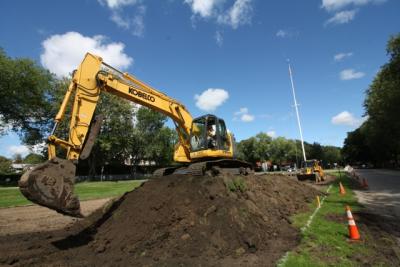Earth Movers on East Hampton Green? Here's Why

Curious what that large earth-moving equipment was doing on the green north of East Hampton's Town Pond this week? Their work there marked the start of a project to improve water quality in Hook and Town Ponds through the construction of a bioswale, a drainage course designed to trap the pollutants and silt from surface runoff before it gets to the ponds.
Approximately a quarter of an acre is being excavated to a depth of 12 to 18 inches at the green, which will be replanted with turf grass in order to create micropools -- shallow pools that remove pollutants from stormwater runoff -- during wet and inclement weather.
After the village green work is completed, the project will move to the green at the Hook Mill and North Cemetery, where another bioswale will be created. The projects will take approximately three weeks to complete, Becky Molinaro, the village administrator, said on Thursday.
"We're excited, and we think all of you out there should be as well," Mayor Paul F. Rickenbach Jr. said of the project at the village board's meeting on Friday. "We have that moral obligation and commitment -- to the universe, to the world, to the earth that we live in, and we definitely have to make it better for future generations."
The water quality of Hook Pond is poor, with dangerously low levels of dissolved oxygen, according to Pio Lombardo, principal of the firm that has conducted water-quality studies for the town and village. Accumulated sediment, stormwater and wastewater discharge, and other sources including fertilizer, waterfowl waste, atmospheric deposition, and agricultural practices are responsible for elevated phosphorus and nitrogen, Mr. Lombardo told village officials last year. These conditions promote harmful algal growth, which in turn depletes dissolved oxygen.
Extensive stormwater runoff accumulates at the village green, which overflows into Town Pond and from there to a feeder stream of Hook Pond via a culvert.
Earlier this year, the East Hampton Village board accepted a bid from Gatz Landscaping of Mattituck to create the bioswales. The $96,359 cost will be offset by a $46,000 grant from the Suffolk County Water Quality Protection and Restoration Program.
